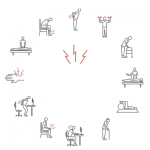
Lightspring / shutterstock.com
In July 2017, Todd A. Graham, MD, a practicing orthopedic surgeon in South Bend, Ind., was fatally shot after getting into a heated dispute with a patient and her husband over a requested opioid prescription.1 The murder of Dr. Graham is a tragic example of the potential dangers of physician-patient disagreements. Rheumatology patients often endure chronic debilitating pain and may request opioids for pain management. With the increase in opioid addiction and overdose, physicians have been more selective in their opioid prescribing practices. Refusing a patient’s request for an opioid prescription can lead patients to feel upset, abandoned or even stigmatized.
Strategies do exist to help physicians safely navigate these difficult and, at times, hostile patient encounters.
Communication Is Key
Effective communication is essential to prevent and defuse difficult patient encounters. Long before a conflict arises, we should practice effective communication skills, including active listening, maintaining eye contact and frequent use of nonverbal affirmations. If a patient has opioid requests you feel are inappropriate, you have a duty to thoroughly explain the reasoning behind your refusal.
When responding to an upset patient, do a self-evaluation to determine how you may be contributing to the conflict. Are you being dismissive toward the patient because of your own personal biases? Do you feel overworked and burned out, resulting in a lack of empathy? Regardless of your personal issues, remember to always maintain professionalism. It is never okay to engage in a verbal spat with a patient or a patient’s family member.
In 2013, The Journal of Family Practice published “How can we better manage difficult patient encounters,” which outlined three key ways to foster positive patient relationships:2
- Name the patient’s emotion;
- Validate the patient’s emotions; and
- Align patient and physician goals.
You never want a patient to feel their pain is being dismissed. Naming their emotion creates an environment in which the patient knows their pain is being addressed. Validating their emotions demonstrates empathy. To reach a resolution, set realistic expectations. If opioids are not the appropriate treatment choice, discuss alternative therapeutic options. Having an open dialogue with your patient will foster a collaborative effort, likely strengthening the physician-patient relationship and decreasing distrust.
When responding to an upset patient, do a self-evaluation to determine how you may be contributing to the conflict.
Refusing Chronic Opioids
Refusing a new opioid medication is easier than refusing to renew a chronic prescription. You may have inherited a patient from a former rheumatology fellow or retired physician. If you have accepted responsibly for the care of this patient, then you have every right to challenge a previous provider’s decision. Explaining your reasons for refusal is the most important step in addressing this issue. Remember:
- Not all opioids are created equal. Consider switching the patient to a less potent opioid.
- Consider safer pharmacologic, complementary or nonpharmacologic treatment options.
- Rheumatologists are not chronic pain specialists; if possible, ask for help.
- Never discontinue a chronic opioid without considering a taper.
Hostile Encounters
Hostile patient encounters are much more challenging to defuse. Dr. Graham’s killer, Michael Jarvis, had a known history of drug addiction, which was likely the driving force behind his desperate act of murder. It is nearly impossible to reason with an irrational or psychotic person and should not be attempted. Act immediately if you feel you are in potential danger. Options:
- Know when to walk away. End the patient encounter immediately when the situation becomes hostile.
- Take all threats seriously. Contact local authorities if violent threats are made to you or your staff.
- Maintain professionalism and composure. Never get into a verbal argument with a patient.
- Properly document the incident in the medical chart.
- Discharge the patient from your practice if feasible.
- Consider hiring a security guard if necessary.
We cannot control the expectations, emotions and reactions of patients when we refuse to write opioid prescriptions. There are, however, communication tools we can use to help navigate these challenging patient encounters when they arise. As physicians, we are leaders in the workplace. We have an obligation to do our best to ensure not just our own safety, but also that of our nurses, ancillary staff and patients. Never take threats lightly; call law enforcement if necessary. R


